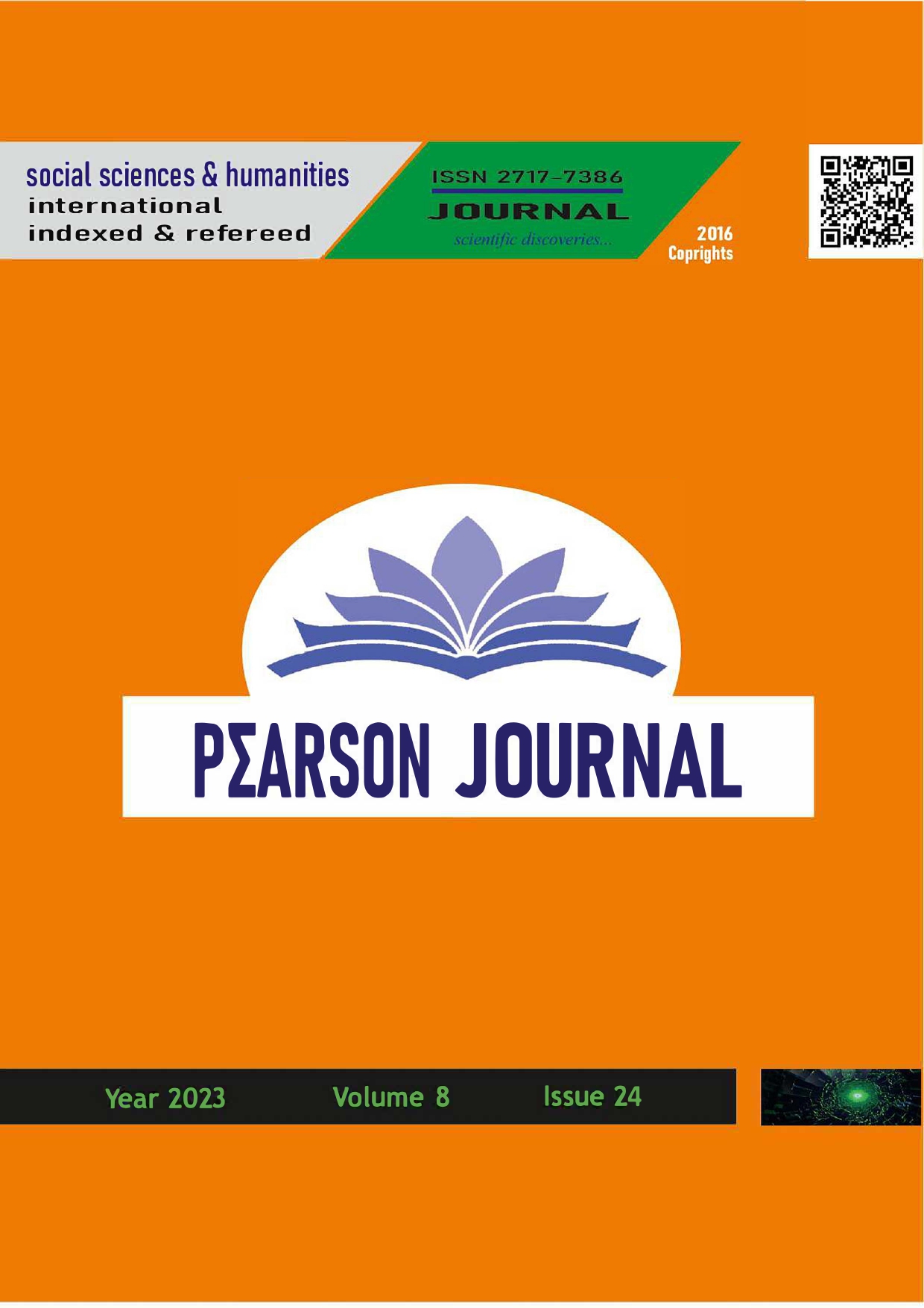Teacher's Opinions on the Use of Materials in Primary School Mathematics Teaching (Kayseri Example)
DOI:
https://doi.org/10.5281/zenodo.8077944Keywords:
Mathematics, Teaching Mathematics, Use of MaterialsAbstract
Affiliated with MEB, Qualitative research method was used in this study, which was conducted to examine the opinions of teachers in the Kayseri district of the province of about the use of materials in mathematics lessons. In this study, it is aimed to determine the teachers' opinions about the use of materials in mathematics lessons by giving place to the Ministry of National Education. In accordance with the purpose of the research, the easily accessible case sampling method was used within the framework of the purpose of the research at the stage of forming the study group. 20 mathematics teachers participated in the research. In line with these issues, open-ended questions were prepared in the light of the information obtained within the scope of the validity study during the preparation process of the interview form. Content analysis was used in the analysis of the data obtained from the interviews with the parents. As a result of the research; Teachers use materials within their own means, come to the lessons prepared, generally lack of materials in schools, insufficient and scarce materials, not adequately protected, no mathematics classrooms, teachers use smart boards as materials, order materials online, use in lessons, classrooms are crowded It has been concluded that there are problems in the use of materials due to the fact that there are problems in the use of materials, and that the curriculum should be supported by many materials to make it concrete for the students to be easily understood.
References
Akın, M. F. (2007). Özdeşlik konusunun öğretiminde yapılandırmacı öğrenme yaklaşımının öğrenme ürünlerine etkileri. Yüksek Lisans Tezi, Dicle Üniversitesi Fen Bilimleri Enstitüsü, Diyarbakır.
Alkan, H. & Altun, M. (1998). Matematik Öğretimi. Eskişehir: Anadolu Üniversitesi.
Altun, M. (2006). Matematik Öğretimi, 17. Baskı, Bursa: Aktüel Yayınları.
Altun, M. (2008). Eğitim Fakültesi ve Sınıf Öğretmenleri İçin Matematik Öğretimi, Ankara: Alfa Yayıncılık.
Asokanthan, S. F. (2008). Active learning methods for teaching dynamics –development and implementation. 37th ASEE/IEEE Frontiers in Education Conference, October 10 – 13.
Aydın, B. & Doğan, M. (2012). Matematik Öğretimi: Geçmişten günümüze matematik öğretimi önündeki engeller. Batman Üniversitesi Yaşam Bilimleri Dergisi, 1(2), 89- 95.
Baykul, Y. (2002). İlköğretimde Matematik Öğretimi, Ankara, İstanbul: Anı Yayıncılık.
Bıkmaz, F. H. (2006). New elementary curricula and teachers. Ankara University Journal of Faculty of Educational Sciences, 39(1), 97-116.
Binbaşıoğlu, C. (2013). Etkinlik Pedagojisi. Yaşamsal, düşünsel ve Üretici Eğitim, Ankara: Anı.
Birgin, O. ve Tutak, T. (2006). Geometri Öğretiminde Bilgisayar Destekli Öğretimin Öğrenci Başarısına Etkisi, IETC 2008, Eskişehir.
Camci, F. (2012). Aktif öğrenmeye dayalı etkinlik temelli öğretimin öğrencilerin akademik becerilerine ve öğrenme sürecine etkisi. Yüksek Lisans Tezi, Adıyaman Üniversitesi Fen Bilimleri Enstitüsü, Adıyaman.
Choo, C. B. (2007). Activity-based approach to authentic learning in a vocational institute. Educational Media International, 44(3), 185–205.
Çekici, H. & Yıldırım H. (2011). Matematik eğitimi üzerine bir inceleme. Marmara Üniversitesi İ.İ.B.F. Dergisi,31(2), 175-196.
Dede, Y. ve Argün, Z. (2003). “Matematik Öğretiminde Elektronik Tabloların Kullanımı”, Pamukkale Üniversitesi Eğitim Fakültesi Dergisi, 2(14), 113–131.
Demirel, Ö. (2013). Kuramdan uygulamaya eğitimde program geliştirme. (20. Baskı).Ankara: Pegem.
Gündüz, vd. (2008). Farklı öğrenim seviyesindeki öğrencilerin rasyonel sayıların farklı gösterim şekilleriyle işlem yapma becerilerinin karşılaştırılması. Pamukkale Üniversitesi Eğitim Fakültesi Dergisi, 23(1), 85-94.
İnan, C. (2006). Matematik Öğretiminde Materyal Geliştirme ve Kullanma, D. Ü. Ziya Gökalp Eğitim Fakültesi Dergisi 7, 47–56.
Kazu, H. Yeşilyurt, E. (2008). Öğretmenlerin Öğretim Araç-Gereçlerini Kullanım Amaçları, Fırat Üniversitesi Sosyal Bilimler Dergisi, 18(2), s. 175–188.
Koç, G. (2000). Etkin öğrenme yaklaşımının eğitim ortamlarında kullanılması. Hacettepe Üniversitesi Eğitim Fakültesi Dergisi, (19), 220-226.
Köroğlu, H. ve Yeşildere, S. (2004). İlköğretim Yedinci Sınıf Matematik Dersi Tamsayılar Ünitesinde Çoklu Zekâ Teorisi Tabanlı Öğretimin Öğrenci Başarısına Etkisi, Gazi Üniversitesi Gazi Eğitim Fakültesi Dergisi, 24(2), s. 25- 41.
Margolinas, C. (Ed.) (2013). Task design in mathematics education: Proceedings of ICMI Study 22. Oxford: University of Oxford.
Ocak, G. & Dönmez, S. (2010). İlköğretim 4. ve 5. sınıf öğrencilerinin matematik etkinliklerine yönelik tutum ölçeği geliştirme. Kuramsal eğitimbilim dergisi, 3(2), 69-82.
Özkurt, H. &Yeğin D.(2009). Matematik öğretimi. Bursa.
Özmantar, M. F., Bozkurt, A., Demir, S., Bingölbali, E. & Açıl, E. (2010). Sınıf öğretmenlerinin etkinlik kavramına ilişkin algıları. Selçuk Üniversitesi Ahmet Keleşoğlu Eğitim Fakültesi Dergisi, (30), 379-398.
San, İ. & Güleryüz H. (2004). Yaratıcı eğitim ve çoklu zekâ uygulamaları. Ankara: Artım.
Swan, M. (2008). Designing a multiple representation learning experience in secondary algebra. Journal of the International Society for Design and Development in Education, 1(1), 1-17.
Titiz, T. (1999) . Ezbersiz Eğitim Yol Haritası. Ankara: Beyaz.
Toprak, Ç. , Uğurel, I. , Tuncer, G. & Yiğit-Koyunkaya, M. (2017). Matematik öğretmen adaylarının matematik öğrenme etkinliğine yönelik algılarının incelenmesi. Kuramsal Eğitimbilim Dergisi, 10(1), 1-30.
Uğurel, I. & Bukova-Güzel, E. (2010). Matematiksel öğrenme etkinlikleri üzerine bir tartışma ve kavramsal bir çerçeve önerisi. Hacettepe Üniversitesi Eğitim Fakültesi Dergisi, 39(1), 333-347.
Umay, A. (2003). Matematiksel muhakeme yeteneği. Hacettepe Üniversitesi Eğitim Fakültesi Dergisi, 24(24), 234-243.
Ünal, M., Akıncı, Ş.& Şahin, F. (2000). Biyolojik kavramların öğretilmesinde modellerin rolü, 4. Fen Bilimleri Eğitimi Kongresi, Hacettepe Üniversitesi. Ankara.
Ünal, S. (2008). Aktif öğrenme, öğrenmeyi öğrenmek ve probleme dayalı öğrenme. M. Ü. Atatürk Eğitim Fakültesi Eğitim Bilimleri Dergisi, (11), 373-378.
Yenilmez, K. & Can, S.(2006). Matematik öğretimi derslerine yönelik görüşler. On Dokuz Mayıs Üniversitesi Eğitim Fakültesi Dergisi, (22), 47-59.
Downloads
Published
How to Cite
Issue
Section
License
Copyright (c) 2023 PEARSON JOURNAL

This work is licensed under a Creative Commons Attribution 4.0 International License.



